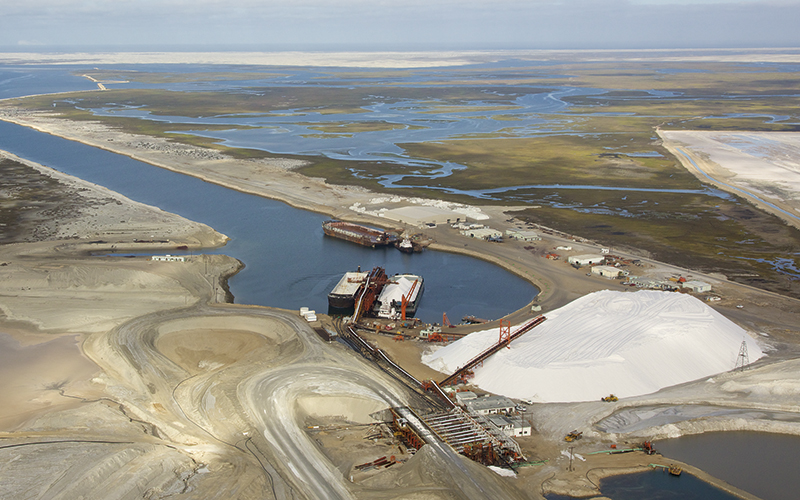Parastatal salt exporter ESSA aims to dramatically
add to already rising profits and production by adding value to its products.

President Enrique Peña Nieto’s Mexico, among many things, is in the process of facilitating the creation of globally competitive industries. Taking advantage of this new scenario of global competitiveness is Exportadora de Sal (ESSA), the world’s largest saltworks, situated on the salt flats of Baja California Sur near Guerrero Negro, a town that has become a byname for the purest quality of salt.
A co-investment between Mexico’s Ministry of Economy’s Mining Pro-motion Trust Fund, which owns 51% of the shares, and the Japanese Mitsubishi Corporation, owning the remaining 49%, ESSA was originally established in 1954 by American naval entrepreneur Daniel K. Ludwig, whose ingenious idea to extract salt from the ocean water by evaporation has turned this everyday element into Mexico’s “white gold”.
In fact, the company and the salt industry have been so important to Mexico’s industry that in May this year, the National Lottery presented a special commemorative 60th anniversary lottery ticket in honor of ESSA. It was also announced earlier this year that Los Cabos was chosen as the site for the 2016 International Salt Symposium; this will be the first time the conference is held in a developing country.
Mexico’s efforts in further opening its economy to the rest of the world has not been the only advantageous element aiding ESSA’s growing presence in the world salt market. ESSA was also recently blessed with the arrival of Jorge Humberto López Portillo, who took over as the company’s CEO in July 2013. Mr. López Portillo’s impressive leadership and immediate decision to increase salt production and profit led the company full throttle into what seems to be the beginning of a golden era.
In the first six months of Mr. López Portillo’s management, ESSA’s production increased by 10%, producing a record 8 million metric tons of industrial salt (compared to an average of 7.2 million metric tons in previous years). A 26% increase in revenue (amounting to $136 million at the end of 2013) increased the company’s net profit by 23%.
“As a mainly publicly owned company, we are world leaders in terms of quality and quantity of production,” Mr. Lopez Portillo proudly states.
The CEO largely attributes ESSA’s recent achievements to the efforts of his staff. Recognizing the importance of his workforce, Mr. López Portillo’s new strategy affects the treatment of his workers by means of, what he calls, “the democratization of Mexican productivity,” whereby the dividends obtained from the efficiency and growth of the company affect the salaries of its workers. “President Peña Nieto is mandating the democratization of productivity and social responsibility, and we, as a parastatal, should set the example,” the CEO says.
Indeed, with the salt works embedded in an environmentally significant location – with 132 documented bird species and a large migration of grey whales – social and environmental responsibility is also, in the CEO’s words, a “key matter”.
The company’s commitment to protecting the surrounding environment is evident by not only the work of their Department of Ecology and Safety, which ensures that all of its activities, products and services remain 100% compatible with the environment, but also by the certifications that ESSA has been awarded, such as the Clean Industry Certification granted in 2000 by Mexican environmental authorities, and the certification of Environmental Management System under the international standard ISO-14-001.
“Recently, Achim Stenier, Executive Director of the UN Environmental Program, told me that never in his life had he been surrounded by so much biodiversity and natural wealth while being in a factory,” relates Mr. López Portillo.
“This made us very proud because it acknowledges that not only are the geographic, geological and atmospheric conditions unique in this corner of the world – nowhere else is there so much flat land along the coast with low precipitation (under two inches) and with winds that help erode the water to form the crystals – but also our installations coexist with the environment and even serve as a habitat. Some 170,000 seabirds, some of which fly all the way from Russia to spend the winter here with us, call our artificial lagoons home.”
Despite the degree of instability that permeates the salt industry – in both world market demand and production – ESSA has for decades maintained an increase in its production, enabling the company to become the world’s third largest exporter of salt, with exports to Japan, the U.S., South Korea, Central America, Canada, Taiwan and New Zealand. However, with smart strategies and big visions, Mr. López Portillo plans to gain momentum: by the end of 2014 ESSA will produce 9.5 million metric tons, with an ultimate objective of reaching 12 million metric tons by the end of 2016, an increase which would represent a 50% rise during the six years of the current administration.
Through the decision to transcend from salt production alone to transformation into value-added products based on global market demand, Mr. López Portillo is ensuring that Mexico has an impact on the chemical industry: one that, as emphasized by President Peña Nieto during the September 2013 G-20 summit in St. Petersburg, is a key market.
With the chemical industry as the largest consumer of salt – NaCl being the base of bromine, potassium sulphate, and polyvinyl chloride, amongst others – by tapping into the derivatives industry, the CEO estimates that ESSA could increase its sales value – currently at $150 million – 100-fold.
Considering ESSA’s advancements and the fact that global demand for salt is forecast to climb 1.5% annually through 2018 to 324 million metric tons, it is no surprise that the Mexican government recognizes salt as their national asset. “Chemical industries around the world prefer to use Guerrero Negro salt; it’s the purest on the market,” highlights Mr. López Portillo.
0 COMMENTS